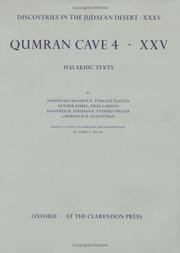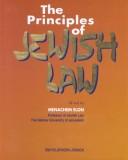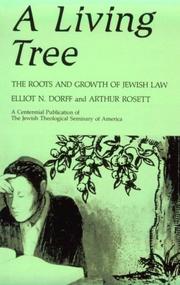| Listing 1 - 10 of 166 | << page >> |
Sort by
|
Book
ISBN: 9783825246815 3825246817 Year: 2016 Publisher: Tübingen Mohr Siebeck
Abstract | Keywords | Export | Availability | Bookmark
 Loading...
Loading...Choose an application
- Reference Manager
- EndNote
- RefWorks (Direct export to RefWorks)
(Zielgruppe)Judaistik --- Dead Sea Scrolls --- Halakha --- Schriftrollen vom Toten Meer

ISBN: 0198270062 9780198270065 Year: 1999 Volume: 35 Publisher: Oxford Clarendon
Abstract | Keywords | Export | Availability | Bookmark
 Loading...
Loading...Choose an application
- Reference Manager
- EndNote
- RefWorks (Direct export to RefWorks)
Manuscrits de la Mer Morte --- Halakha --- 4Q --- Dead Sea scrolls. --- Qumrān (Cisjordanie ; site archéologique) --- 229*311.1 --- Qumran: tekstuitgaven--in de oorspronkelijke taal --- 229*311.1 Qumran: tekstuitgaven--in de oorspronkelijke taal --- 4Q. --- Halakha. --- Qumrān (Palestine ; site archéologique)
Book
ISBN: 9401206422 1435695410 9781435695412 904202478X 9789042024786 904202478X 9789042024786 9789401206426 Year: 2008 Publisher: Amsterdam New York Rodopi
Abstract | Keywords | Export | Availability | Bookmark
 Loading...
Loading...Choose an application
- Reference Manager
- EndNote
- RefWorks (Direct export to RefWorks)
This book is a first attempt to examine the thought of key contemporary Jewish thinkers on the meaning of tradition in the context of two models. The classic model assumes that tradition reflects lack of dynamism and reflectiveness, and the present’s unqualified submission to the past. This view, however, is an image that the modernist ethos has ascribed to the tradition so as to remove it from modern existence. In the alternative model, a living tradition emerges as open and dynamic, developing through an ongoing dialogue between present and past. The Jewish philosophers discussed in this work—Joseph B. Soloveitchik, Yeshayahu Leibowitz, David Hartman, and Eliezer Goldman—ascribe compelling canonic status to the tradition, and the analysis of their thought discloses the tension between these two models. The book carefully traces the course they have plotted along the various interpretations of tradition through their approach to Scripture and to Halakhah.
Tradition (Judaism) --- Tradition (Philosophy) --- Jewish philosophy. --- Jews --- Philosophy, Jewish --- Philosophy, Israeli --- Traditionalism (Philosophy) --- Philosophy --- Halacha --- Halakha --- Oral law (Judaism) --- Oral tradition (Judaism) --- Zugot
Book
ISBN: 9788496820975 8496820971 8490962707 8415636725 Year: 2013 Volume: 139 Publisher: Madrid Casa de Velázquez
Abstract | Keywords | Export | Availability | Bookmark
 Loading...
Loading...Choose an application
- Reference Manager
- EndNote
- RefWorks (Direct export to RefWorks)
Au carrefour entre l’histoire économique et l’histoire culturelle, cet ouvrage propose une réflexion collective sur le besoin d’expertise à l’époque médiévale. Les prises de décision devaient parfois être éclairées par des hommes qui maîtrisaient mieux que d’autres les domaines en cause et étaient, de ce fait, en mesure de trouver des solutions. Cela est particulièrement vrai lorsque des questions techniques ou éthiques étaient soulevées et que des choix devaient être faits à partir de l’argumentation d’un expert. La qualité des produits, les processus de fabrication ou la mesure de leur valeur donnaient lieu à des contrôles pour lesquels il fallait des personnels à la fois compétents et forts d’une notoriété reconnue par les autorités en place : il s’agissait d’éviter ou de réprimer les fraudes, de défendre l’honneur de la ville ou celui du métier et de protéger le bien commun en garantissant le produit. Tout au long de cette époque, ont été développées des pratiques juridiques et techniques reposant sur la reconnaissance des savoirs et des compétences de l’expert, figure particulière désignée par la puissance publique. Ce livre propose une approche originale des problématiques et des questionnements rarement — voire jamais — appliqués au champ de la vie économique au Moyen Âge. A medio camino entre la historia económica y la historia cultural, este libro examina la necesidad de peritaje en la Edad Media, época en la que se desarrollaron prácticas jurídicas y técnicas basadas en el reconocimiento de los saberes y competencias del experto, figura designada por el poder público para ilustrar la toma de decisiones, especialmente cuando se planteaban cuestiones técnicas o éticas.
Expertise --- Valuation --- Appraisers --- Evidence, Expert --- Evaluation --- Experts --- Expertises --- Economic aspects --- History --- Histoire --- Aspect économique --- Aspect économique --- Experiencia. --- Experience. --- knowledge. --- Conocimiento. --- Knowledge, Theory of --- Philosophy --- Psychology --- Reality --- Pragmatism --- France --- Espagne --- expert --- 14e siécle --- halakha --- concejos --- cacherout --- shehita --- shohet --- Sibiu
Book
ISBN: 1618112791 9781618112798 1322500002 9781322500003 9781618118462 1618118463 9781618112781 1618112783 Year: 2014 Publisher: Boston Academic Studies Press
Abstract | Keywords | Export | Availability | Bookmark
 Loading...
Loading...Choose an application
- Reference Manager
- EndNote
- RefWorks (Direct export to RefWorks)
The Mishna Berura is, without a doubt, Rabbi Israel Meir Kagan's greatest and most complex contribution to the canon of Orthodox Jewish Law; it is a singular work that synthesizes Jewish traditions, laws, and mores into a practical halakhic guide to daily religious life. For all of his traditionalism, Rabbi Kagan was an iconoclast, and the Mishna Berura broke from many of the traditional approaches of deciding halakhic directives. Instead, he favored studying, engaging, and asserting decisions in a nuanced, almost natural approach to how ethical people should live their daily lives consistent with Jewish law. Today, the Mishna Berura has gained widespread recognition and is considered authoritative by essentially all of contemporary Orthodox Jewry, a measure of greatness that few works of Halakha have attained. Michael J. Broyde and Ira Bedzow here investigate this seminal text and explore its background and decision-making process.
Jewish law --- Codification. --- Israel Meir, --- Biblical law --- Civil law (Jewish law) --- Halacha --- Halakha --- Halakhah --- Hebrew law --- Jews --- Law, Hebrew --- Law, Jewish --- Law, Mosaic --- Law in the Bible --- Mosaic law --- Torah law --- Law --- Law, Semitic --- Commandments (Judaism) --- codification

ISBN: 0706514157 Year: 1974 Publisher: Jerusalem Encyclopaedia Judaica
Abstract | Keywords | Export | Availability | Bookmark
 Loading...
Loading...Choose an application
- Reference Manager
- EndNote
- RefWorks (Direct export to RefWorks)
Jewish law --- Biblical law --- Civil law (Jewish law) --- Halacha --- Halakha --- Halakhah --- Hebrew law --- Jews --- Law, Hebrew --- Law, Jewish --- Law, Mosaic --- Law in the Bible --- Mosaic law --- Torah law --- Law, Semitic --- Commandments (Judaism) --- Law --- Mishpat Ivri --- Mishpaṭ ha-ʻIvri
Book
ISBN: 9783110387025 3110387026 9783899497946 3899497945 9783111751610 3111751619 Year: 2017 Publisher: Berlin Boston
Abstract | Keywords | Export | Availability | Bookmark
 Loading...
Loading...Choose an application
- Reference Manager
- EndNote
- RefWorks (Direct export to RefWorks)
This book provides a concise introduction to the basics of Jewish law. It gives a detailed analysis of contemporary public and private law in the State of Israel, as well as Israel’s legal culture, its system of government, and the roles of its democratic institutions: the executive, parliament, and judiciary. The book examines issues of Holocaust, law and religion, constitutionalization, and equality. It is the ultimate book for anyone interested in Israeli Law and its politics. Authors Shimon Shetreet is the Greenblatt Professor of Public and International Law at the Hebrew University of Jerusalem, Israel. He is the President of the International Association of Judicial Independence and World Peace and heads the International Project of Judicial Independence. In 2008, the Mt. Scopus Standards of Judicial Independence were issued under his leadership. Between 1988 and 1996, Professor Shetreet served as a member of the Israeli Parliament, and was a cabinet minister under Yitzhak Rabin and Shimon Peres. He was senior deputy mayor of Jerusalem between 1999 and 2003. He was a Judge of the Standard Contract Court and served as a member of the Chief Justice Landau Commission on the Israeli Court System. The author and editor of many books on the judiciary, Professor Shetreet is a member of the Royal Academy of Science and Arts of Belgium. Rabbi Walter Homolka PhD (King’s College London, 1992), PhD (University of Wales Trinity St. David, 2015), DHL (Hebrew Union College, New York, 2009), is a full professor of Modern Jewish Thought and the executive director of the School of Jewish Theology at the University of Potsdam (Germany). The rector of the Abraham Geiger College (since 2003) is Chairman of the Leo Baeck Foundation and of the Ernst Ludwig Ehrlich Scholarship Foundation in Potsdam. In addition, he has served as the executive director of the Masorti Zacharias Frankel College since 2013.The author of "Jüdisches Eherecht" and other publications on Jewish Law holds several distinctions: among them the Knight Commander’s Cross of the Austrian Merit Order and the 1st Class Federal Merit Order of Germany. In 2004, President Jacques Chirac admitted Rabbi Homolka to the French Legion of Honor.
Jewish law. --- Biblical law --- Civil law (Jewish law) --- Halacha --- Halakha --- Halakhah --- Hebrew law --- Jews --- Law, Hebrew --- Law, Jewish --- Law, Mosaic --- Law in the Bible --- Mosaic law --- Torah law --- Law, Semitic --- Commandments (Judaism) --- Law --- Jews (Law).
Book
ISBN: 0191682365 9780191682360 Year: 1996 Publisher: Oxford : Clarendon,
Abstract | Keywords | Export | Availability | Bookmark
 Loading...
Loading...Choose an application
- Reference Manager
- EndNote
- RefWorks (Direct export to RefWorks)
15 distinct periods are separately studied in this volume, each one by a leading specialist, and the emphasis throughout is on the development of the institutions and sources of the law, providing teachers with the essential background material from which a variety of sources, from many different perspectives, may be taught.
Jewish law. --- Jewish law --- History. --- History --- Biblical law --- Civil law (Jewish law) --- Halacha --- Halakha --- Halakhah --- Hebrew law --- Jews --- Law, Hebrew --- Law, Jewish --- Law, Mosaic --- Law in the Bible --- Mosaic law --- Torah law --- Law, Semitic --- Commandments (Judaism) --- Law

ISBN: 1438401426 9781438401423 9780887064609 0887064604 0887064590 0887064604 9780887064593 Year: 1988 Publisher: Albany, N.Y. State University of New York Press
Abstract | Keywords | Export | Availability | Bookmark
 Loading...
Loading...Choose an application
- Reference Manager
- EndNote
- RefWorks (Direct export to RefWorks)
Jewish law --- Jewish law. --- Biblical law --- Civil law (Jewish law) --- Halacha --- Halakha --- Halakhah --- Hebrew law --- Jews --- Law, Hebrew --- Law, Jewish --- Law, Mosaic --- Law in the Bible --- Mosaic law --- Torah law --- Law, Semitic --- Commandments (Judaism) --- History. --- Law
Book
ISBN: 1438405863 0585045143 9780585045146 0791421430 0791421449 9780791421437 9780791421444 9781438405865 9781438405865 Year: 1995 Publisher: Albany State University of New York Press
Abstract | Keywords | Export | Availability | Bookmark
 Loading...
Loading...Choose an application
- Reference Manager
- EndNote
- RefWorks (Direct export to RefWorks)
Judaism --- Jewish law --- Biblical law --- Civil law (Jewish law) --- Halacha --- Halakha --- Halakhah --- Hebrew law --- Jews --- Law, Hebrew --- Law, Jewish --- Law, Mosaic --- Law in the Bible --- Mosaic law --- Torah law --- Law, Semitic --- Commandments (Judaism) --- History --- Sources. --- Law
| Listing 1 - 10 of 166 | << page >> |
Sort by
|

 Search
Search Feedback
Feedback About UniCat
About UniCat  Help
Help News
News